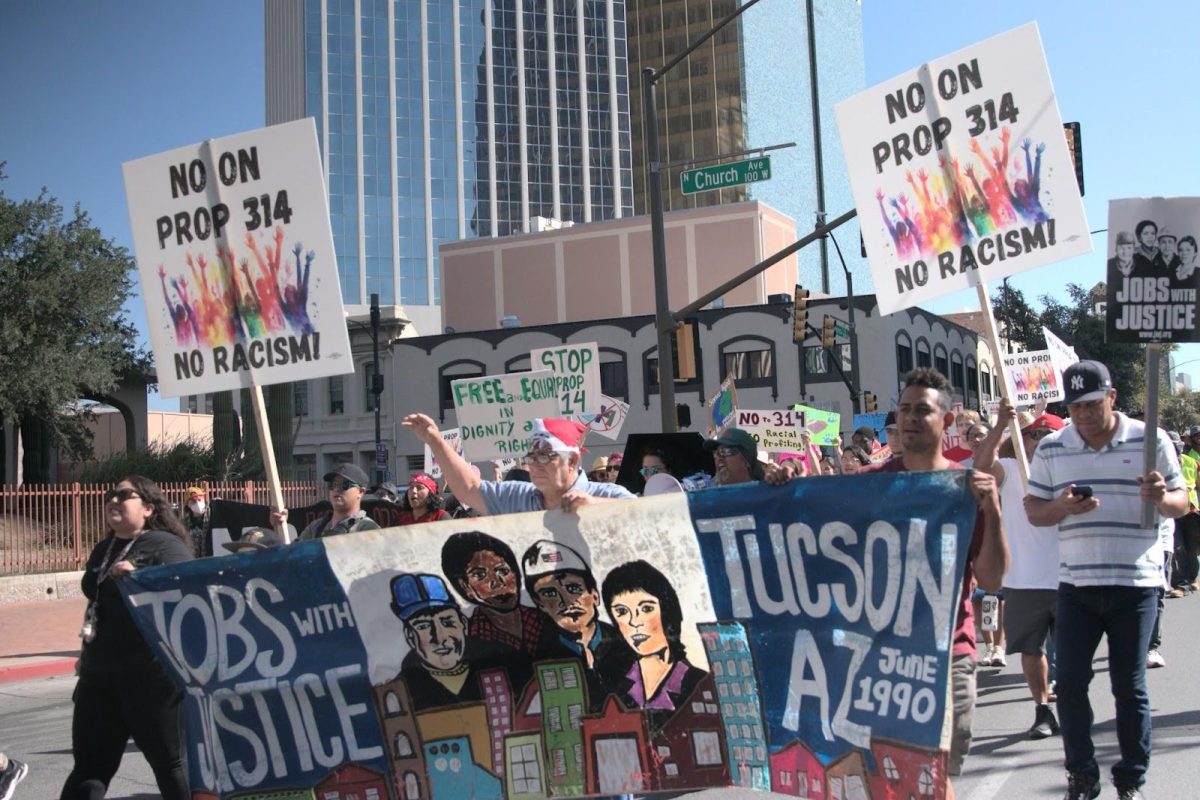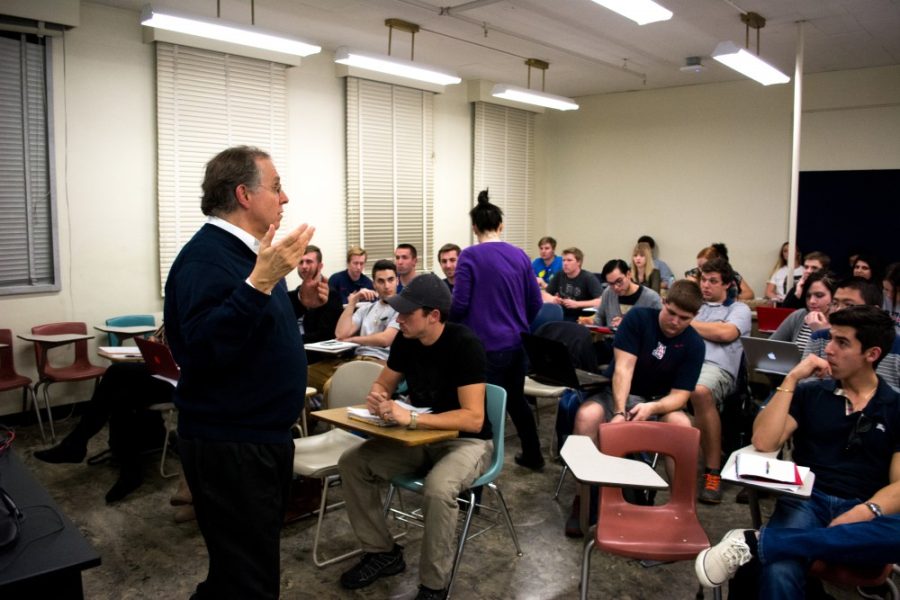With the election less than three weeks away, Arizonans will soon have the chance to vote on a range of ballot propositions that could impact their communities. The 13 measures address various key issues, from tipped wages to abortion, topics that have been at the forefront of voter concerns. Among the most significant issues, both nationwide and locally, is immigration.
According to the Pew Research Center, 44% of Americans surveyed consider increasing security at the U.S.-Mexico border to be a very important goal for U.S. immigration policy. 25% of Americans surveyed consider establishing a path to citizenship for non-citizens is also a very important goal for U.S. immigration policy.
With Proposition 314 on the ballot, Arizona is no stranger to prospective immigration legislation.
Proposition 314 is a legislative ballot measure introduced to the Arizona House of Representatives in February as the “Secure the Border Act” following the veto of a similar bill by Governor Katie Hobbs.
The proposition would make it a misdemeanor or felony to enter the United States outside of its official ports of entry. It would also give state, city and regional police the ability to detain non-citizens who cross the border unlawfully.
Additionally, the proposition would allow state judges to order deportations. It would also require individuals to enroll in the E-Verify program to confirm their immigration status prior to enrollment in public welfare programs such as federal financial aid. Criminal penalties would be applied if false documents for the purposes of employment or public welfare benefits were to be submitted.
The proposition would also increase penalties for the sale of fentanyl.
The measure was later amended by the Arizona State Senate. The amended bill added criteria for probable cause by law enforcement and established conditions for ordering individuals to return to either their country of origin or country in which they entered from. The amendment also removed legal protections and defenses available for DACA recipients under the context of the bill, one of them being protection from deportation.
Supporters of Proposition 314 view it as an opportunity to increase border security and issues associated with lack thereof.
“It establishes a legal framework that enables state authorities to protect their communities, uphold the rule of law, and mitigate the detrimental effects of uncontrolled immigration and drug trafficking,” Andrew Adams, chairman of the Legislative District 14 Republican Party executive board said.
Rep. Ben Toma, who also supports Proposition 314, sees it as an opportunity to raise awareness of where the federal government has shortcomings.
“This [proposition] is not anti-immigrant. This [proposition] is anti-lawlessness. It’s about securing our border, because the federal government has failed to do their job,” Toma said.
Regarding federal law, entering the United States at a location that is not an official port of entry is already enforced by the U.S. Customs and Border Protection. Tucson falls within the radius of the 100-mile border zone, which allows Border Patrol proceedings to occur without disruption. Also, non-citizens currently do not qualify for federal programs.
The March to Stop Proposition 314 took place the morning of Friday, Oct. 11 at the Josefina Ahumada Worker Center. Community members and associations came together to call for people to vote against Proposition 314 in the upcoming general election. Community members protesting compared the proposition to SB 1070, a law passed previously in Arizona aiming to reduce the state’s undocumented immigrant population.
Josefina Ahumada Worker Center’s goal is to platform members of the community who work in trades, creating a network of mutual aid. The center said they hosted the rally because the “immigrant community is the backbone of our economy and brings cultural diversity to our state.”
Peñaflori Ibarraㅡa member of Josefin Ahumada Worker Centerㅡmigrated from Peru to the United States searching for work. Ibarra left because of “the uncertainties within political figures and governmental systems.”
“If I would have stayed behind, I would have been killed,” Ibarra said.
Ibarra has been in the U.S. for almost two and a half years. Ibarra left behind his three children and the mother of his children who he described as a brave woman. Now Ibarra is a U.S. migrant worker.
“We are workers and we work well,” Ibarra said about migrant workers.
Jim Byrne, President of the Tucson Education Association spoke at the rally and explained his group’s motivations in opposing the proposition.
“We’re here as union members, as educators, because we have personal family members who would be racially profiled by this. We have coworkers, we have students and their family members as well, and community members who are important to us, and we just take a principled stand against something that is racist, discriminatory and dehumanizing,” Bryne said.
Byrne said propositions such as 314 affect student behavior in schools.
“Coming from [Cholla High School], the fear is real. Whether it’s not having their parents come on campus, being concerned about family members, knowing that family members are indefinitely detained in one of the for-profit private prisons and detention centers, it’s real. It has a huge impact on their psyche, their mentality and just on who they are as a person,” Bryne said.
Carolina Silva is the Executive Director of Scholarships A-Z, a Tucson-based non-profit that supports undocumented students through scholarships, workshops and mentorship. At the rally, Silva spoke on her experiences growing up undocumented in Tucson.
“Unfortunately I had to experience family separation within my own family. I think people don’t realize that when we allow policies like this to take into effect, it’s not necessarily about targeting dangerous people, or it’s not about securing the border, it’s about policing your very own community, and that means putting black and brown bodies on the line,” Silva said.
Silva said that she was disappointed to see a proposition so similar to other anti-immigrant bills being voted on again.
“I feel like the fact that politicians would go as far as to put it on the ballot again and try to pass this racist [proposition] just tells us how out of touch they are with communities and that they’re trying to harm communities when they really should be serving the interest of community members across Arizona,” Silva said.
Local leaders such as Adelita Grijalva, Lane Santa Cruz and Tucson Mayor Regina Romero were also present pre and post-rally, voicing their opposition to Proposition 314.
“Immigration issues are the responsibility of federal governments and cities like Tucson and our police department will be overwhelmed. It will cost people money. It will cost cities money, it will cost counties money, it will cost the state money. And this is unfunded. For the people out there thinking that this is the way to resolve [the] broken immigration system, this is not the way,” Romero said.
The Grand Canyon Institute, a nonpartisan think-tank, estimates that Proposition 314 would cost an excess of $325 million annually to Arizona taxpayers.
Follow the Daily Wildcat on Instagram and Twitter/X









